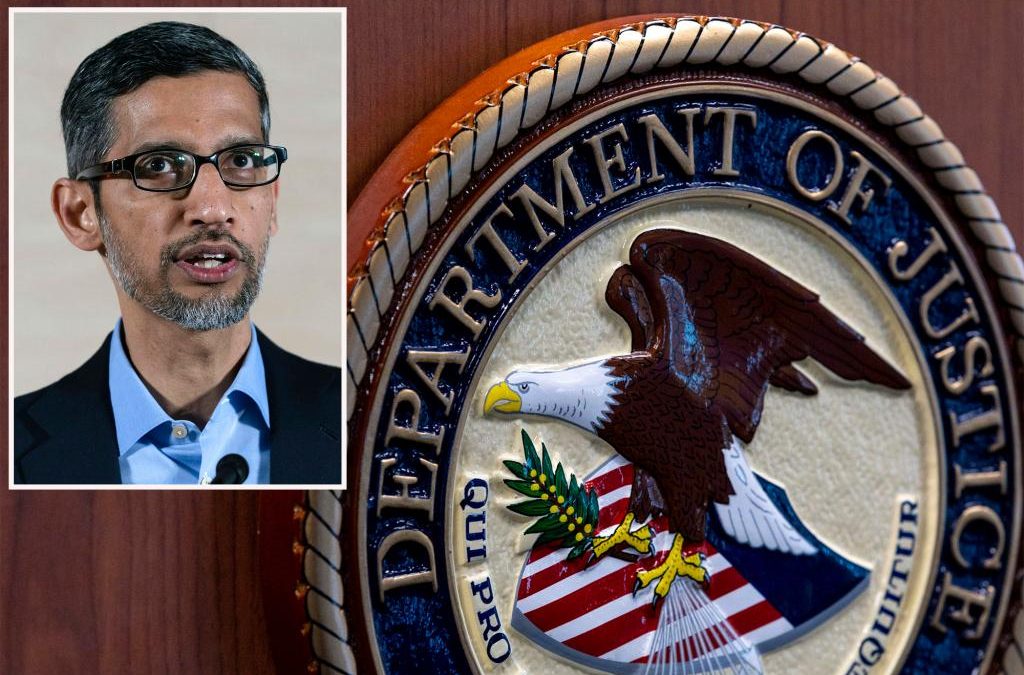Google is finally slated to face its long-awaited antitrust trial next week brought by the US Justice Department, with prosecutors alleging that the tech giant has used a string of illegal business deals to cement the dominance of its ubiquitous search engine.
The DOJ has spent three years preparing to take Google to court since it first accused Google of illegally eliminating competitors by paying billions of dollars each year to smartphone makers including Apple and Samsung to make sure its search engine is pre-loaded as the default onto their web browsers.
In the suit, filed in 2020 in Washington, DC, federal court, the DOJ claims that Google has long broken the law in its quest to remain “the gateway to the internet” — illegally gaining a leg up on competitors such as Microsoft’s Bing, Mozilla and DuckDuckGo.
In response, Google has argued that its deals with phone makers including Apple — which reportedly has taken as much as $15 billion a year in payments from Google — were not exclusive, as consumers were free to alter the default settings on their devices.
The epic trial — the first major US monopoly trial of the modern internet age — is anticipated to last 10 weeks starting on Tuesday. Google CEO Sundar Pichai, as well as top executives from Apple and other tech companies, are expected to take the witness stand, according to the New York Times.
Collectively, the DOJ and Google have already collectively deposed more than 150 individuals for the case, and have produced more than 5 million pages of documents.
In its lawsuit, the Justice Department described Google in the late 1990s and early 2000s as “the darling of Silicon Valley as a scrappy start-up with an innovative way to search the emerging internet.”
“That Google is long gone.”
The Justice Department has asked that Google change its allegedly unlawful business practices, potentially pay damages and restructure its businesses.
There won’t be a jury. Rather, President Barack Obama-appointed Judge Amit P. Mehta will be presiding over the case and will issue the final ruling.
Representatives for the Justice Department did not immediately respond to The Post’s request for comment.
The Post has also sought comment from the DOJ’s litigator, Kenneth Dintzer, and Google’s counsel, John Schmidtlein, a partner at Williams & Connolly.
Kent Walker, Google’s president of global affairs, told The Post: “This is a backwards-looking case at a time of unprecedented innovation, including breakthroughs in AI, new apps and new services, all of which are creating more competition and more options for people than ever before.”

“People don’t use Google because they have to — they use it because they want to. It’s easy to switch your default search engine — we’re long past the era of dial-up internet and CD-ROMs. Our success is hard fought, and the result of our focus on building services that help Americans every day. We look forward to making our case in court,” Walker added.
Even before the trial has kicked off, legal teams on both sides have been aggressive in making their cases, with Google most recently arguing in a court filing that the Justice Department’s head of antitrust, Jonathan Kanter, has a “deep-seated bias” against the company.
In the court documents, Google reiterated its long-held stance that Kanter’s past work for Google rivals such as Microsoft, Yelp and New York Post parent News Corp. represents a conflict of interest — asserting that he received “millions of dollars” in private practice to push for antitrust action.
The company further alleged that Kanter “is using public office to accomplish what he was unable to do in private practice on behalf of his paying clients.”

The DOJ, meanwhile, argued that Google filed “unusual, invasive and irrelevant discovery requests” related to Kanter’s involvement in the case. The feds also asked the judge to stop Google from arguing it has engaged in selective enforcement of antitrust laws.
Mehta has already struck down parts of the federal monopoly trial earlier this month in a win for Google, dismissing four counts that were included in the lawsuit after determining that government attorneys had failed to show the company damaged rivals like Yelp and Expedia with its online search practices.
Mehta ruled that the states’ allegation pertaining to search results “relies not on evidence but almost entirely on the opinion and speculation of its expert.”
“Simply put, there is no record evidence of anticompetitive harm,” the judge wrote.
Google’s famed search engine was created by Sergey Brin and Larry Page when the two were close friends as PhD students at Stanford University in the 1990s.
After growing into a multibillion-dollar success, Google was restructured into Alphabet in 2015, with Alphabet becoming the parent company of the search engine and its several other subsidiaries.
Brin served as Alphabet’s first president while Page assumed the role of chief executive.
Pichai, who previously served as Google’s product chief, then became the CEO of Google.
Source




